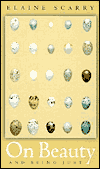I have begun Elaine Scarry's book On Beauty and Being Just, a short book that looks to be utterly fascinating. I'm particularly excited because she has already quoted from Proust twice (in the course of the first 20 pages), and I've become interested in what Proust says about the function of beauty and art (see yesterday's post). Is there a function of art and beauty, and, if so, what? Scarry has not answered this yet, but she has said some wonderful things about how beauty operates and has begun to analyze errors we make when it comes to recognizing beauty.
These errors include, among others, thinking something is beautiful when it is not, or thinking something is not beautiful when it really is (she discusses one of her own errors: thinking that palm trees are not beautiful when they are). Here is what she says about Proust:
Proust, for example, says we make a mistake when we talk disparagingly or discouragingly about "life" because by using this general term, "life," we have already excluded before the fact all beauty and happiness, which take place only in the particular: "we believed we were taking happiness and beauty into account, whereas in fact we left them out and replaced them by syntheses in which there is not a single atom of either." Proust gives a second instance of a synethic error:
"So it is that a well-read man will at once begin to yawn with boredom when one speaks to him of a new 'good book,' because he imagines a sort of composite of all the good books that he has read, whereas a good book is something special, something unforeseeable, and is made up not of the sum of all previous masterpieces but of something which the most thorough assimilation ... would not enable him to discover."
(I am sorry if you do not like or do not want to hear more about Proust; I'm quickly discovering that so much of what I read that's not Proust ends up connecting back to Proust after all.) I really like this idea: don't talk about life or beauty in purely abstract terms because the terms then become meaningless. The terms must relate to something particular. And Scarry does a wonderful job of discussing the particular in the course of considering the abstract; she references many authors, she gives her own examples, she calls on the reader to provide his or her examples, and she is particularly attune to the way beauty works on the body:
And, finally (can you believe I've only read 20 pages in the book, with small pages and big print!, and have come across all this already?), Scarry has wonderful things to say about beauty in the university:A visual event may reproduce itself in the realm of touch (as when the seen face incites an ache of longing in the hand, and the hand then presses pencil to paper), which may in turn then reappear in a second visual event, the finished drawing. This crisscrossing of the senses may happen in any direction. Wittgenstein speaks not only about beautiful visual events prompting motions in the hand but, elsewhere, about heard music that later prompts a ghostly subanatomical event in his teeth and gums. So, too, an act of touch may reproduce itself as an acoustical event or even an abstract idea, the way whenever Augustine touches something smooth, he begins to think of music and of God.
I don't tend to think of the work of a university as perpetuating beauty, but I really, really like the idea.This willingness continually to revise one's own location in order to place oneself in the path of beauty is the basic impulse underlying education. One submits oneself to other minds (teachers) in order to increase the chance that one will be looking in the right direction when a comet makes its sweep through a certain patch of sky. The arts and sciences, like Plato's dialogues, have at their center the drive to confer great clarity on what already has clear discernibility, as well as to confer initial clarity on what originally has none ... By perpetuating beauty institutions of education help incite the will toward continual creation ... To misstate or even merely understate the relation of universities to beauty is one kind of error that can be made. A university is among the precious things that can be destroyed.




|